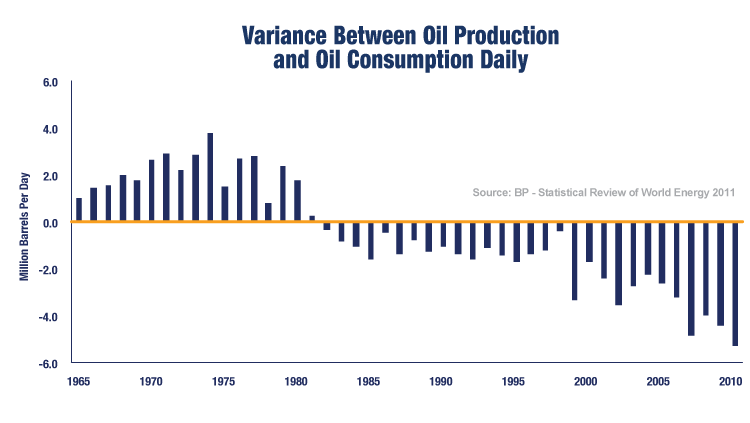
The Economist Online recently posted a short article entitled "Running Dry" which offered another perspective that would support OPEC raising its quotas. Taking a page out of BP's recently released "Statistical Review of World Energy 2011", The Economist highlighted BP's global data showing that average daily crude oil consumption exceeded production by over five million barrels per day during 2010. This is the widest daily gap on record going back to 1965. As you can see from our graphic which subtracts annual consumption from production, you have to go back to 1981 to find the last year where production outpaced consumption. So to sound any alarms based on the most recent year of BP's data seems a bit short-sighted.
However, looking at the data over the long run still seems to verify the obvious facts. First, new discoveries coming on line at levels sufficient to offset reservoir declines and growing global energy demand is not the current reality. Second, the growing fundamental imbalance between supply and demand will favor increasing prices over an extended time period.
But we did find something in the data that we thought readers would also find interesting. Whether coincidental or not - you be the judge. When the annual surpluses and shortages are added together, starting with 1965, the first year in BP's Statistical Review; the point where crude oil actually went into a deficit position (per BP's data) is around the same time oil prices really started to surge (i.e. 2004).

Our commentary is that current prices reflect the anticipated levels of supply and demand, whether an imbalance will or does exist, and whether it's growing or shrinking. Setting aside storage costs and the time value of money; out month futures for crude at higher prices than current suggest the world's level of supply is not sufficient. However, a persistent global economic slowing over the next six to twelve months (if it does occur) would likely prove OPEC's decision leave quotas as is, a good call. Considering the mixed agenda's behind OPEC's recent quota setting (instead of a unified view that there is plenty of oil available to meet world demand), then if they did get it right this time it will likely be for the wrong reasons.




No comments:
Post a Comment